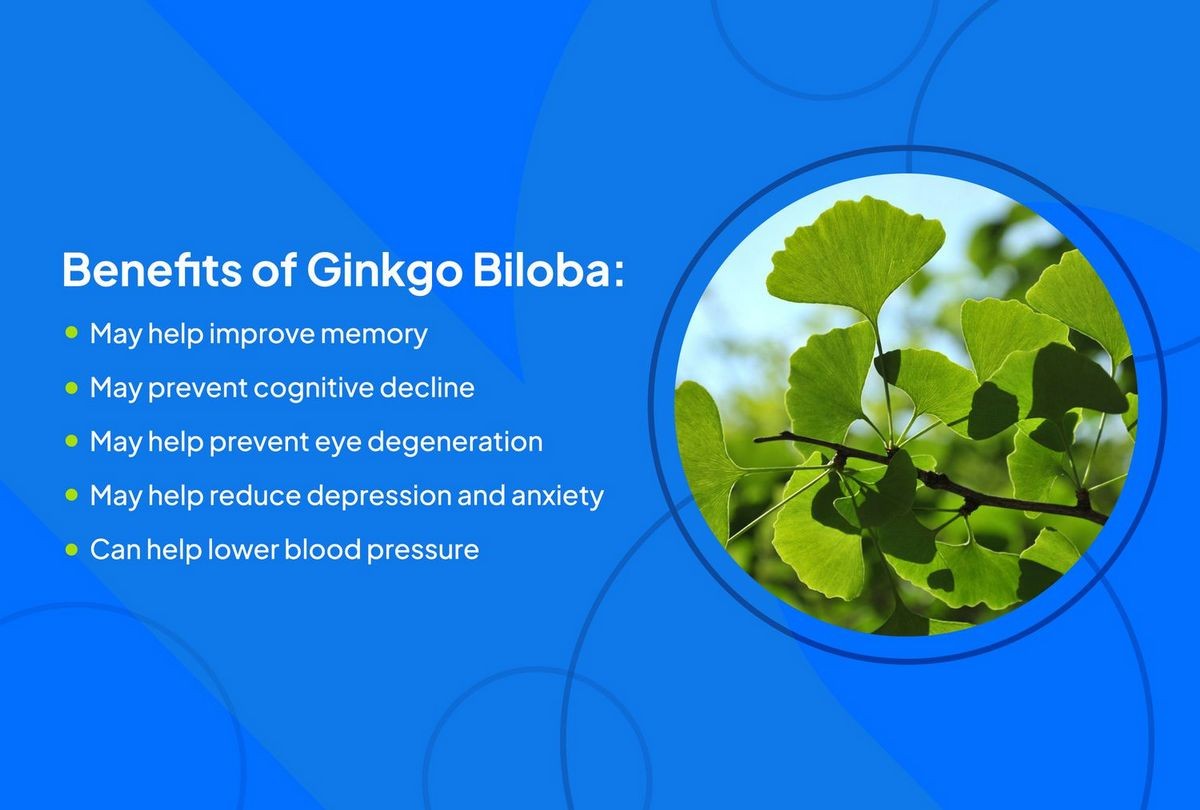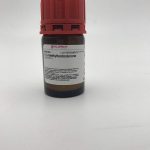
Contents
Ginkgo Biloba
Ginkgo biloba is a leaf extract from the leaves of the ginkgo biloba tree. It is used as a dietary supplement for various conditions. Ginkgo biloba is available over-the-counter in the U.S. in the form of tablets, capsules, teas, or liquid extracts. The formulation may vary between manufacturers.
Ginkgo biloba leaves contain several compounds, including terpene lactones and ginkgo flavone glycosides. These are the primary active components, present in varying concentrations. Studies on rodents indicate that ginkgo biloba may:
- Reduce stress-induced hypersecretion of corticosteroids from the adrenal glands.
- Improve nerve signaling by inhibiting brain enzymes that break down neurotransmitters.
- Act as an antioxidant, protecting nerve cells from oxidative stress.
- Improve short-term memory and age-related changes in the brain.
- Reduce inflammatory activity and blood clotting by blocking platelet-activating factor.
- Dilate blood vessels and improve blood flow.
The suggested uses of ginkgo biloba include altitude sickness prevention, reducing cardiovascular disease risk, treating cerebral vascular insufficiency, cognitive disorders, dementia, dizziness and vertigo, intermittent claudication, macular degeneration, glaucoma, memory loss, premenstrual syndrome (PMS), sexual dysfunction, and vasodilation.
Ginkgo biloba is marketed as a dietary supplement in the U.S. and does not undergo the same rigorous testing as drugs. The FDA has not approved any of its suggested uses due to insufficient evidence. Clinical studies in humans have not definitively shown efficacy for ginkgo biloba.
A study by the National Toxicology Program (NTP) found that ginkgo biloba extract could increase the risk of liver cancer and thyroid gland cancer in mice and rats.
Warnings
- Avoid ginkgo if you are hypersensitive to it.
- Discontinue ginkgo at least 36 hours before surgery to reduce the risk of bleeding.
- Avoid ginkgo if attempting to get pregnant.
- Ginkgo toxin is mainly in the seeds and fruit pulp, but is also present in the leaves.
- Use caution if taking non-steroidal anti-inflammatory drugs (NSAIDs), anticoagulants, or anti-platelet therapy.
- Use caution in patients with epilepsy as it may decrease seizure threshold.
- Ginkgo can cause serotonin syndrome in patients on antidepressant medications.
- Use caution in diabetic patients as ginkgo may increase blood glucose levels.
Side Effects
Common side effects of ginkgo biloba include gastrointestinal upset, nausea, vomiting, constipation, diarrhea, headache, weakness, dizziness, vertigo (rare), restlessness, seizures, palpitations, allergic skin reactions, contact dermatitis, impaired fertility, bleeding disorders, subdural hematoma, spontaneous bleeding from the iris, serotonin syndrome, and an increase in blood sugar.
This is not a complete list of side effects. Consult your doctor for medical advice and report any side effects or health problems to the FDA at 1-800-FDA-1088.
Dosages
Adult
There is no standard dose of ginkgo biloba supplements. Suggested doses of leaf extract standardized to 24% flavonoids and 6% terpenes include:
Altitude Sickness Prevention
- 80 mg taken orally twice daily
Cognitive Function
- 120-240 mg taken orally once daily
- 120-240 mg taken orally in divided doses two to three times daily
Intermittent Claudication
- 120-240 mg taken orally in divided doses two to three times daily
- 80 mg taken orally twice daily; start on day 16 and continue until day 5 of the next cycle
SSRI-induced Sexual Dysfunction
- 60-240 mg taken orally twice daily
- 120-160 mg/day taken orally in divided doses two to three times daily
Raynaud’s Disease
- 360 mg/day taken orally in divided doses three times daily
Normal-Tension Glaucoma
- 40 mg taken orally three times daily for 4 weeks
Pediatric
Insufficient evidence to recommend ginkgo biloba use in children.
Overdose
- Overdose of ginkgo biloba can cause bleeding, seizures, and serotonin syndrome.
- No antidote for ginkgo biloba overdose; treatment involves discontinuation and symptomatic therapy.
Drug Interactions
Inform your doctor of all medications you are currently taking to check for drug interactions. Ginkgo biloba has no known severe or serious reactions but can interact moderately with at least 75 different drugs. Mild interactions include anamu, cilostazol, clopidogrel, devil’s claw, dipyridamole, eptifibatide, green tea, prasugrel, ticlopidine, and tirofiban.
Keep your doctor informed about all medications, both prescription and over-the-counter, to ensure safety.
Pregnancy and Breastfeeding
Avoid using ginkgo biloba during pregnancy or while breastfeeding due to a lack of data on its safety.
Other Information
- Ginkgo biloba is one of the most commonly used dietary supplements in the U.S. It is generally safe but must be used with caution due to side effects and interactions with other medications and supplements.
- Dietary supplements do not require extensive FDA approval, and discrepancies may arise between labeling and actual ingredients.
Summary
Ginkgo biloba is a leaf extract used as a dietary supplement. It is recommended for various conditions, including altitude sickness prevention, reducing cardiovascular disease risk, treating cerebral vascular insufficiency, cognitive disorders, dementia, dizziness and vertigo, intermittent claudication, macular degeneration, glaucoma, memory loss, premenstrual syndrome (PMS), sexual dysfunction, and vasodilation. Side effects include gastrointestinal upset, nausea, vomiting, constipation, diarrhea, headache, weakness, dizziness, vertigo, restlessness, seizures, palpitations, and others.


